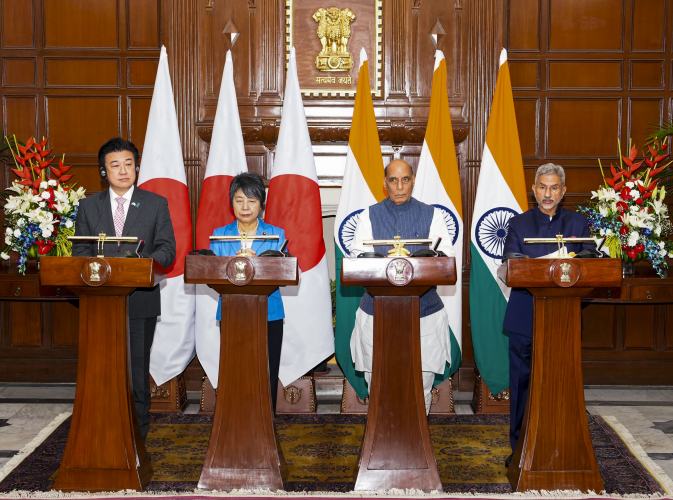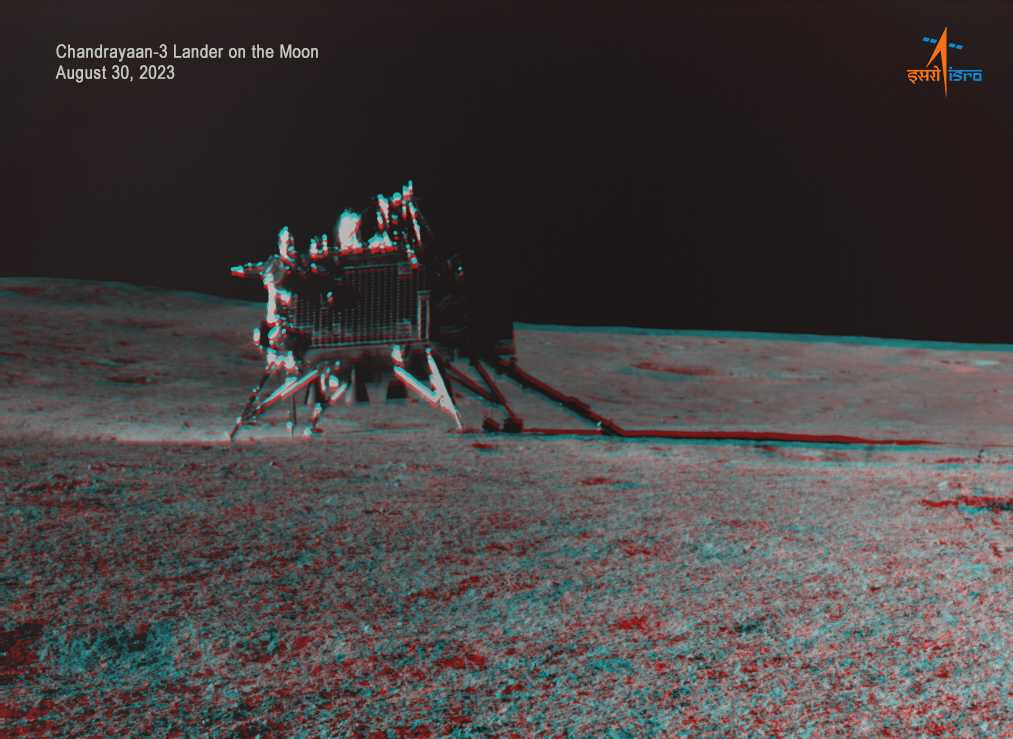
Defence Minister Rajnath Singh and External Affairs Minister S Jaishankar with Japan's Defence Minister Minoru Kihara and Foreign Minister Yoko Kamikawa ahead of the third Japan-India 2+2 Foreign and Defence Ministerial meeting at the Hyderabad House, in New Delhi, Tuesday, Aug. 20, 2024. A PTI Photo
NEW DELHI (PTI): India on Tuesday called on Japan to remove regulatory bottlenecks that exist in sharing of critical technologies even as the two sides vowed to work vigorously towards the common goal of ensuring a free and open Indo-Pacific in the face of China's aggressive military posturing in the region.
At the third '2+2' foreign and defence ministerial dialogue, India and Japan also agreed to prepare a new framework for security cooperation in line with the desire to further expand the overall strategic ties.
The Indian delegation at the talks was headed by External Affairs Minister S Jaishankar and Defence Minister Rajnath Singh. The Japanese team was led by Foreign Minister Yoko Kamikawa and Defence Minister Kihara Minoru.
A joint statement said the ministers appreciated the successful completion of the cooperation in the areas of Unmanned Ground Vehicle/Robotics.
It said they also appreciated the progress made for the transfer of Unified Complex Radio Antenna (UNICORN) and related technologies and early signing of related arrangements.
The UNICORN will be fitted onboard Indian naval ships, officials said.
"A free, open and rules-based Indo-Pacific is the top priority for both our countries. We explored the possibility of coordinating our respective security and development assistance where our interests converge," Jaishankar said in his media statement.
He also announced India's decision to establish a new consulate in the Japanese city of Fukuoka.
Kamikawa, in an oblique reference to China's military muscle-flexing in the Indo-Pacific, told media: "We reaffirmed our commitment to object to unilateral attempts to change the status quo by force and uphold the free and open international order based on the rule of law."
The Japanese foreign minister said both sides reaffirmed strong determination to cooperate for regional peace and prosperity.
In his remarks, Jaishankar said both sides discussed the unfolding new avenues for technology, research and industrial cooperation while underlining the importance of trust-based collaboration in emerging technologies, including in the field of defence.
"Such trust-based collaboration in emerging technologies, including in the field of defence, will progress best when our approaches to technology sharing evolve," he said.
"To this end, I requested our Japanese colleagues to look into the regulatory bottlenecks that currently exist," he said.
Jaishankar also said that India and Japan are resolute in their opposition to terrorism, including cross-border terrorist activities.
The joint statement said the ministers unequivocally condemned terrorism and violent extremism in all its forms and called for bringing the perpetrators of 26/11 Mumbai, Pathankot, and other attacks to justice.
It said they called for concerted actions against all UN-listed terrorist groups including Al Qaeda, ISIS/Daesh, Lashkar-e-Tayyiba (LeT), Jaish-e-Mohammad (JeM) and their proxy groups, and to take resolute actions to root out terrorists' safe havens and eliminate terrorist financing channels.
The joint statement said the ministers shared their intention to revise and update the 2008 joint declaration on security cooperation between India and Japan to reflect contemporary priorities.
It also said the ministers concurred on accelerating future cooperation in defence equipment and technology and welcomed the Indian Navy and Japan Maritime Self Defense Force exploring future cooperation in the area of ship maintenance in India.
"In addition, the ministers concurred on exploring discussions for coordination and cooperation in the field of defence and security assistance to third countries for peace and stability in the Indo-Pacific region," it said.
In his media statement, Jaishankar said the discussions also focused on strengthening capacity-building cooperation, including on dealing with challenges emanating in the cyber space.
He said both sides agreed to "task our officials with preparing a new framework for security cooperation". "We also shared our desire for a new vision for our overall partnership that orients our relations in line with our evolving national goals and priorities," he said.
Jaishankar said the discussions at the '2+2' meeting have paved the way for a "robust agenda" of cooperation on cross-cutting defence and foreign policy issues.
The '2+2' dialogue with Japan was initiated to further deepen bilateral security and defence cooperation and bring greater depth to the special strategic and global partnership between the two countries.
India has the '2+2' ministerial format of dialogue with very few countries including the US, Australia and Russia.
 Previous Article
Previous Article Next Article
Next Article













The Indian Air Force, in its flight trials evaluation report submitted before the Defence Ministry l..
view articleAn insight into the Medium Multi-Role Combat Aircraft competition...
view articleSky enthusiasts can now spot the International Space Station (ISS) commanded by Indian-American astr..
view article